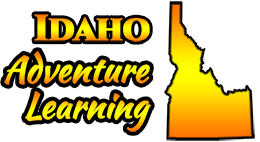Interconnected
Submitted by Cheryl Werhner on Wed, 2017-07-12 00:00
Oh the tangled web we weave. Our complicated connection with all the stakeholders of the Boise watershed became even more complicated today when we visited the SUEZ water treatment facility. We were given a great tour of this privately owned water treatment system. So there I started scratching my head….humm...private. Some stats that I learned: 82 million gallons of water are drawn into the facility per day. Of that water, 70% comes from wells that tap into the aquifer, and the remaining 30% comes directly from the Boise River. The untreated water goes through a complex process and is then shipped to the purchaser; us. In the summer, 70% of the treated water is used by homeowners for home irrigation. It seems that they do a highly complex job with an amazing amount of infrastructure, but I’m still hung up on the concept of privately owned.
All the stakeholders in this complicated puzzle seem interconnected; water rights, the New York Canal, irrigation issues and food production, habitat preservation, recreation, and safety around water. The complexity is mind boggling.
As a newbie in Boise I am eager to know what you think about the SUEZ water treatment facility and its service to our community?

Comments
Interconnected
Oh the tangled web we weave. Our complicated connection with all the stakeholders of the Boise watershed became even more complicated today when we visited the SUEZ water treatment facility. We were given a great tour of this privately owned water treatment system. So there I started scratching my head….humm...private. Some stats that I learned: 82 million gallons of water are drawn into the facility per day. Of that water, 70% comes from wells that tap into the aquifer, and the remaining 30% comes directly from the Boise River. The untreated water goes through a complex process and is then shipped to the purchaser; us. In the summer, 70% of the treated water is used by homeowners for home irrigation. It seems that they do a highly complex job with an amazing amount of infrastructure, but I’m still hung up on the concept of privately owned.
All the stakeholders in this complicated puzzle seem interconnected; water rights, the New York Canal, irrigation issues and food production, habitat preservation, recreation, and safety around water. The complexity is mind boggling.
As a newbie in Boise I am eager to know what you think about the SUEZ water treatment facility and its service to our community?
Water as a Right
As we discussed yesterday, private companies should not have the legal ability to tap into public lands to sell water. Water should be treated as a human right rather than simply "blue gold" that is used as capitol. A chemical that courses through every cell of living organisms should neither be bought nor sold.
Utility
Suez is a utility company that helps manage municipal water much in the same way Idaho Power is a privately held utility company that helps manage the Treasure Valley's power needs. There are definite issues to discuss regarding how these types of companies manage the public trust, but to simply look at them as private companies tapping into public resources does them a disservice. The water that we drink and use in our homes, and businesses, needs to be treated. That takes resources (money). If the local government was doing this, they would have to charge us water fees, or significantly raise our taxes, in order to provide this service. Instead, local government contracts with Suez, who charges us water fees to provide this service. Either way, we are paying for our water to somebody!
A different situation would be the large mega corporation Nestle tapping into local aquifers to bottle water to sell commerically all over the nation, as is happening in California and other parts of the country. Or really, any industrial situation where a company is using large amounts of local water, to make a profit at the local communities expense.
Private and Public
Hi Brian,
Thank you for sharing perspectives on public versus private utility. Contracting with the government is a reasonable manner to acquire clean drinking water for the City of Boise and a good option for many government agencies around the United States. My comparison of Suez to Nestle was misinformed, Suez provides water for the people while Nestle seeks capitol from a public resource. Power is also a topic in which a balance between public and private can be optimal.
Hey Brian, Thanks for all the
Hey Brian, Thanks for all the good info.
We discussed Nestle in class and how they would come in, even in other countries, and use the water resources, pillage, and leave. I’m not suggesting that as an alternative. I do still wonder what the governing regulations there are on SUEZ. I have only known water treatments that are part of a “public works” where it is government owned and regulated (and of course paid for by the owner or tax payer). The idea of a “for profit” conjures up a monopoly on our water, and stirs up questions about how they acquired the water rights. I’m not suggesting anything shady, but I am questioning a fairness issue. The homestead act issued these water rights upon settlement and I am wondering why the government didn’t take it back as the city populated, to be regulated and developed from a public standpoint.
Now that that is said, and after a tour of the SUEZ, the infrastructure in the treatment plant was clean, well organized, and had a vision for the future. I couldn’t find its regulating bodies on its web page (although I might need to dig a little more) but Idaho Power had the regulating bodies clearly stated on the first page. It’s a great discussion.